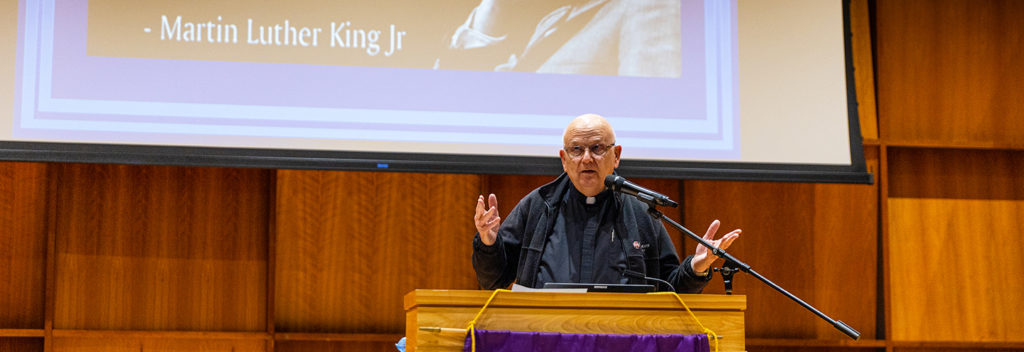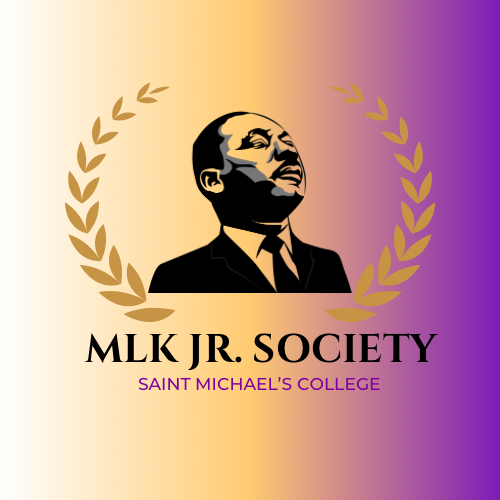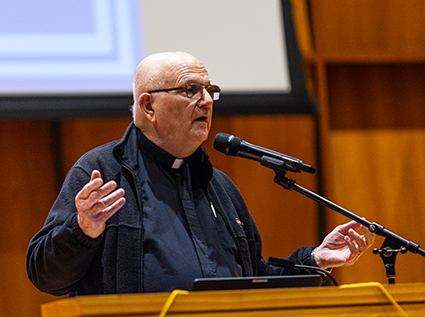
Fr. Richard Myhalyk speaks in the McCarthy Recital Hall Tuesday. The large image behind the headline shows a PowerPoint slide behind him connecting Dr. Martin Luther King to the Edmundite Selma Missions history. (photos by Peyton Edwards ’23)
Fr. Richard “Dick” Myhalyk, S.S.E. ’66 spoke on Tuesday, February 15, 2022, in the McCarthy Arts Center at Saint Michael’s College about the history of Edmundite missions in Selma and rural Alabama as well as his own vocational work.
After graduating from Saint Michael’s in 1966 with a chemistry degree, Fr. Myhalyk went on to become an ordained Edmundite priest in 1971. Later he earned his master’s in theology from the Institute for Black Catholic Studies at Xavier University, and he has an honorary doctorate from Saint Michael’s. A former Edmundite superior general, he is an enthusiastic amateur historian and served the Selma missions for many years prior to his present posting at Enders Island in Connecticut.
Fr. Myhalyk’s focus to start his lecture was the question of how we see our neighbor. “We see life from our own prison… if you change where you’re standing, you see a very different perspective,” he said.
The speaker shared some history of the Edmundites, telling how these founders of Saint Michael’s College established a strong volunteer and social justice culture that is still important on campus. Though he acknowledged that the Edmundite religious order, like many other Catholic institutions, has been far from perfect, Fr. Myhalyk said that the stated mission of the Edmundites at their founding was “to bring back to the Church people who had been alienated from it.”
He told how the Catholic history of Selma, AL, began around 1850 because railroads and steamboats made the town accessible to missionaries. In 1937 when two Edmundite priests established the Selma missions, 20 percent of Roman Catholics in the Deep South were Black, and Pope Pius XI thought it would be beneficial to send Edmundites to Selma as missionaries. Edmundites, assisted by the Sisters of St. Joseph, helped Black citizens establish themselves in advantageous ways. For instance, the Sisters of St. Joseph trained Black women to teach or become nurses, helping them find employment once the Civil Rights Act passed, he said. Edmundite missionaries established the Bosco Boy’s Club and instructed young Black men in understanding the importance of saving, studying, and working. Fr. Myhalyk displayed photos of the Bosco Boy’s Club reunions over half a century later, further demonstrating the success of the men involved.
During their work, especially in the years leading up to the 1960s, the Edmundite missionaries made some enemies. Fr. Myhalyk showed photos of threatening messages left by the KKK on the doors where Edmundites were working, but also explained the tenacity of the missionaries involved. In 1965, the Bishop in Alabama banned the Edmundites and nuns from getting involved in the civil rights movement, but the Edmundites and nuns continued their work on the sidelines. Notably, the Sisters of St. Joseph helped treat the injured among the Black population following protests.
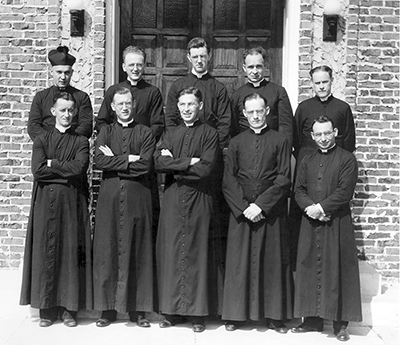
Edmundites at the Selma Missions in the early days. (archival photo)
In 1986, Edmundites established the Bosco Nutrition Center in Selma. The Bosco Boy’s Club since been absorbed by other community clubs, so the building became Bosco Nutrition Center. Myhalyk stated with pride how the Bosco Nutrition Center has served at least one, and now serves two meals, every day since its opening in 1986.
Much of the work of the Edmundites throughout the 20th century involved volunteering and social justice, which established a strong presence for those values at Saint Michael’s College, Myhalyk said. Since the College’s founding in 1904, students have immersed themselves in social justice work, both locally, such as volunteering at the Winooski wool mills in labor activism in the early twentieth century, and outside of Winooski, such as mission trips in Selma during the 1930s.
“In many ways,” Fr. Myhalyk said, “MOVE can be traced back to when I was a student!” He was referring to the Mobilization of Volunteer Efforts office within Edmundite Campus Ministry, founded by the late Edmundite Fr. Mike Cronogue — a ministry that has been enabling direct student participation in the Edmundite volunteer service ethos for decades.
Fr. Myhalyk ended his lecture by saying of his and all Edmundites’ efforts to serve others in the Selma missions and elsewhere that “work is not finished, and there is much to be done.”
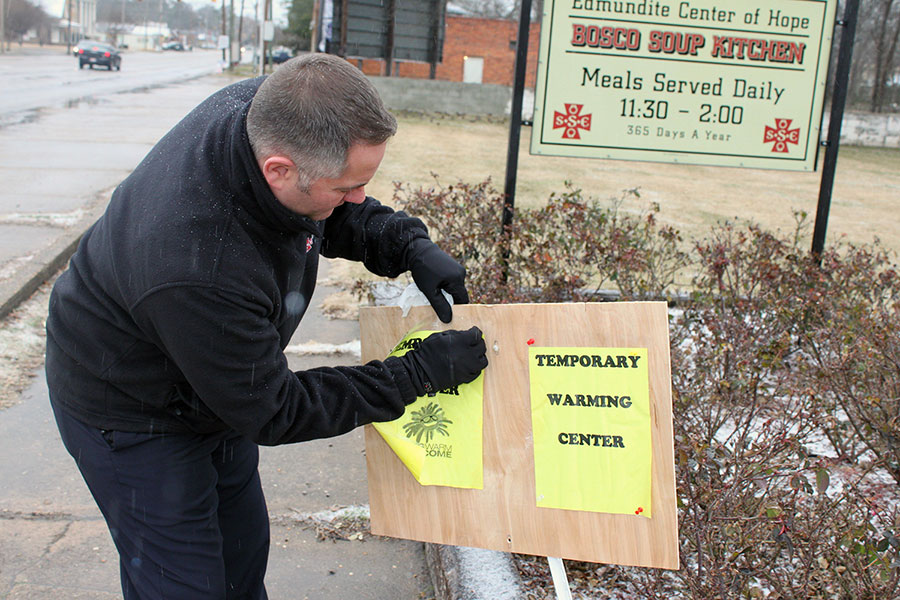
Chad McEachern ’91, CEO of the Edmundite Missions today, at work by the Nutrition Center in this file photo.

For all press inquiries contact Elizabeth Murray, Associate Director of Communications at Saint Michael's College.
